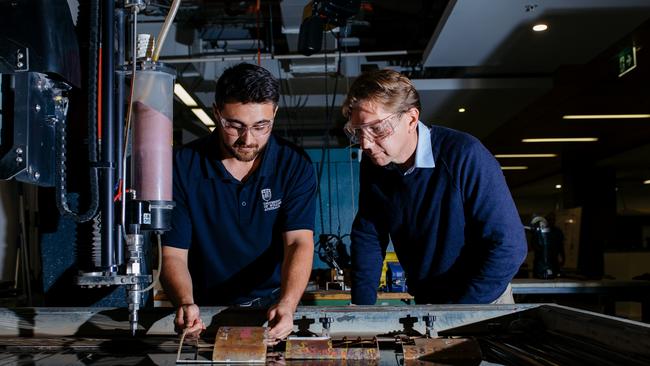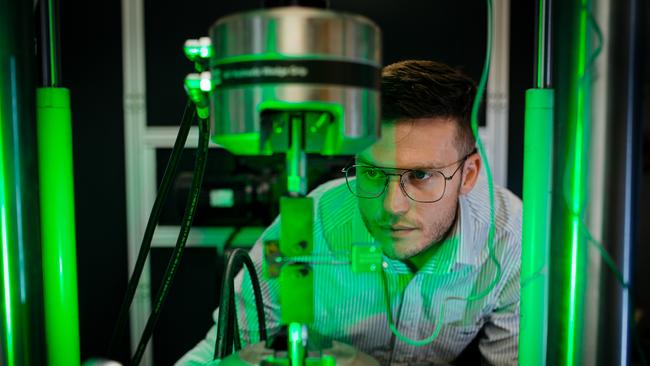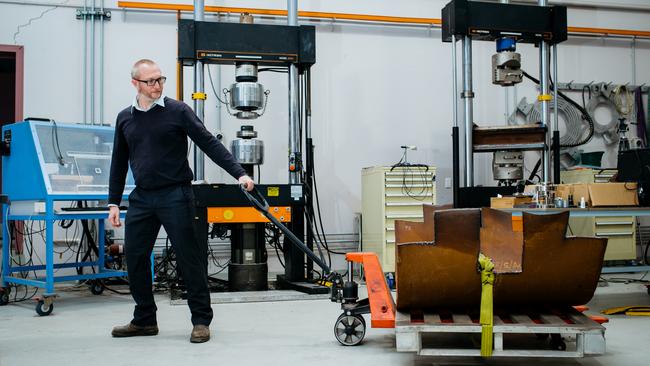APA Group says existing pipelines can carry hydrogen but the alternative gas is decades away
APA Group has proved existing pipelines can carry potentially corrosive hydrogen but its boss says commercial distribution is a long way away.

Commercial distribution of hydrogen in Australia is still “decades away”, according to APA boss Adam Watson, despite the company revealing early success testing its pipelines to carry the gas.
The pipeline giant on Friday released the results of its second phase of testing on the use of its existing pipelines to carry hydrogen.
Results had shown it was ‘technically feasible” to use its existing infrastructure in Western Australia to transport the gas under pressure, which is an important step forward, according to Mr Watson, on the way to the eventual use of hydrogen as a replacement fuel for methane.
Still, the APA boss said that although the results were positive, widespread use of hydrogen as a fuel was far away.
“What’s important to understand is that being able to convert from natural gas to hydrogen is going to take decades,” he said.
“The requirements to be able to change industry production methods – or for a consumer to replace all of their existing appliances, cooktop, heaters, whatever it may be – that’s decades away for logistical reasons.

“But also just cost; and one of the critical things with the energy transition is it needs to be staged in a very responsible way.”
APA is testing the ability of a 43km length of its pipeline in the Kwinana heavy industrial area in WA to carry hydrogen.
It’s part of feasibility studies with WA conglomerate Wesfarmers which runs a natural gas-driven plant in the area, supplying explosives to the West Australian mining industry.
The ability of existing gas pipelines to carry hydrogen is one of the factors throwing a major shadow over the emergence of the gas as a replacement for methane, given hydrogen can have a corrosive effect on steel known as “embrittlement” that could shorten the life of pipelines, or allow the gas to escape.
The latest round of test work was conducted in the laboratory. It took samples of the pipeline material and subjected them to high-purity hydrogen under similar pressure to those that occur when the lines are used to carry methane. This tested the effect hydrogen has on the steel’s susceptibility to fatigue and fracturing.
The research was partly funded by the WA government and was conducted in partnership with the Future Fuels Co-operative Research Centre and the University of Wollongong.

Mr Watson said the results, which have been made available in a public document, show it is technically feasible to use the pipeline to carry hydrogen under pressure without significant effects on its operating life.
He said that, based on the company’s initial assessment, the results suggested there was a “high likelihood” that about half of the company’s 15,000km of pipeline network across the country would be able to carry hydrogen with little change to its operating life.
Mr Watson told The Weekend Australian the early results were a significant step forward, as the company believed converting existing lines would cost about 10 to 20 per cent of the capital needed to completely replace existing pipeline networks.
“We can bring hydrogen to market cost-effectively by being able to utilise our existing infrastructure,” he said.
But the next round of safety testing on the short length of pipeline will still take up to two years.
Mr Watson said the results of the testing suggested that there would be only a minimal cost to convert the Kwinana pipeline to carry hydrogen, and its use would not change the 40-year economic life of the asset.
While hydrogen embrittlement continued to be a concern that needed further work, the study suggested it could be safely managed.




To join the conversation, please log in. Don't have an account? Register
Join the conversation, you are commenting as Logout